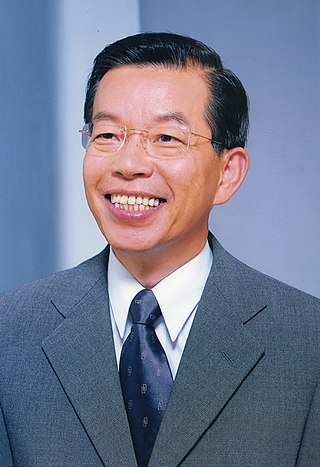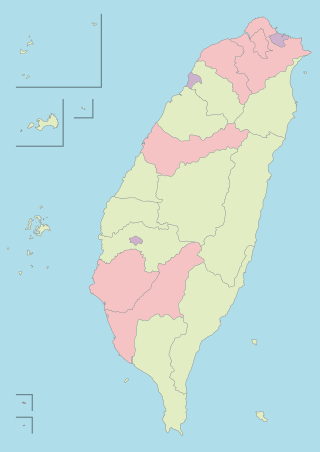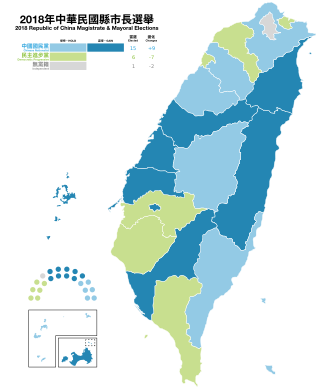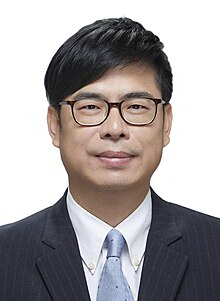
Taiwan, officially known as the Republic of China (ROC), is governed in a framework of a representative democratic republic under a five-power system first envisioned by Sun Yat-sen in 1906, whereby under the constitutional amendments, the President is head of state and the Premier is head of government, and of a multi-party system. Executive power is exercised by the Executive Yuan. Legislative power is vested primarily in the Legislative Yuan. The judiciary is independent of the executive and the legislature. In addition, the Examination Yuan is in charge of validating the qualification of civil servants, and the Control Yuan inspects, reviews, and audits the policies and operations of the government. The party system is currently dominated by two major parties: the Kuomintang (KMT), which broadly favors closer links to mainland China, and the Democratic Progressive Party (DPP), which broadly favors status quo and sovereignty.
In many countries, a mayor is the highest-ranking official in a municipal government such as that of a city or a town. Worldwide, there is a wide variance in local laws and customs regarding the powers and responsibilities of a mayor as well as the means by which a mayor is elected or otherwise mandated. Depending on the system chosen, a mayor may be the chief executive officer of the municipal government, may simply chair a multi-member governing body with little or no independent power, or may play a solely ceremonial role. A mayor's duties and responsibilities may be to appoint and oversee municipal managers and employees, provide basic governmental services to constituents, and execute the laws and ordinances passed by a municipal governing body. Options for selection of a mayor include direct election by the public, or selection by an elected governing council or board.

Frank Hsieh Chang-ting is a Taiwanese politician and former defense attorney. A cofounder of the Democratic Progressive Party, he has served on the Taipei City Council, the Legislative Yuan, as the mayor of Kaohsiung City, and as the Premier of the Executive Yuan under president Chen Shui-bian. Hsieh was the DPP nominee in the 2008 presidential election and was defeated by Ma Ying-jeou. Hsieh is currently the head of the Representative of Taiwan to Japan.
There are eleven types of elections in Taiwan which, since 2012, have been unified into general and local elections, each held every four years, typically in January and November respectively. There may also be by-elections. Electoral systems include first-past-the-post, proportional representation, single non-transferable voting, and a parallel mixture of the above.
Regular elections in Croatia are mandated by the Constitution and legislation enacted by Parliament. The presidency, Parliament, county prefects and assemblies, city and town mayors, and city and municipal councils are all elective offices. Since 1990, seven presidential elections have been held. During the same period, ten parliamentary elections were also held. In addition, there were nine nationwide local elections. Croatia has also held three elections to elect members of the European Parliament following its accession to the EU on 1 July 2013.

This is a timeline of the Republic of China.

Romania elects on a national level a head of state – the president – and a legislature. The president is elected for a five-year term by the people. The Romanian Parliament has two chambers. The Chamber of Deputies has currently 330 members, elected for a four-year term by party-list proportional representation on closed lists. The Senate has currently 136 members, elected for a four-year term by party-list proportional representation on closed lists.

Local elections were held in Taiwan on 3 December 2005 to elect magistrates of counties and mayors of cities, councillors in county/city councils and mayors of townships and cities, known as the three-in-one elections, on 10 June 2006 to elect representatives in township/city councils and village chiefs, on 9 December 2006 to elect mayors and councillors of special municipalities, and on 30 December 2006 to elect village chiefs in Taipei City.
A municipal council is the legislative body of a municipality or local government area. Depending on the location and classification of the municipality it may be known as a city council, town council, town board, community council, rural council, village council, or board of aldermen.

Municipal elections were held in South Africa on 1 March 2006, to elect members to the local governing councils in the municipalities of South Africa. The municipalities form the local government of South Africa and are subdivisions of the provinces, thus making them responsible for local service delivery, such as electricity, water and fire services.

The Mayor of Taipei is the head of the Taipei City Government and is elected to a four-year term. Until the election of Tsai Ing-wen, the office was seen as a stepping stone to the presidency: presidents Lee Teng-hui, Chen Shui-bian and Ma Ying-jeou have all held this position prior to being elected president.

The Mayor of Tainan is the head of the Tainan City Government, Taiwan and is elected to a four-year term. The current mayor is Huang Wei-cher of the Democratic Progressive Party since 25 December 2018.

Chen Chi-mai is a Taiwanese politician and the current Mayor of Kaoshiung since August 24, 2020. He has served as spokesperson of the Democratic Progressive Party and the chief executive officer of its Policy Research and Coordinating Committee. A physician from Keelung, Chen started his political career by becoming member of the Legislative Yuan in 1996 and served as legislator for almost eight years before becoming the spokesperson of the Executive Yuan.

The Mayor of New Taipei is the chief political executive of the city of New Taipei in Taiwan. The mayor, a new position created when the predecessor entity of New Taipei, Taipei County, was elevated to a special municipality in 2010, is elected to a four-year term. The equivalent position in the former county was Taipei County Magistrate. The incumbent mayor is Hou Yu-ih, who returned to office on 14 January 2024 after a temporary leave of absence for the 2024 Taiwanese presidential election as the Kuomintang nominee.

Special municipality, historically known as Yuan-controlled municipality, is a first-level administrative division unit in the Republic of China (Taiwan). Along with provinces, it is the highest level of the country's administrative structure under its territorial jurisdiction and is equivalent to a province. After the suspension of the provincial governments of 2018, the special municipalities along with provincial cities and counties have all governed directly under the central government.

The Mayor of Taoyuan is the chief executive of the Taoyuan City Government. Taoyuan City is a special municipality of the Republic of China (Taiwan). It was formerly known as the magistrate of Taoyuan before 25 December 2014 when Taoyuan was still a county. This list includes directly elected magistrates of the county during that time period.

The 2017 United States elections were held, in large part, on Tuesday, November 7, 2017. This off-year election featured gubernatorial elections in Virginia and New Jersey, as well as state legislative elections in both houses of the New Jersey Legislature and in the Virginia House of Delegates. Numerous citizen initiatives, mayoral races, and a variety of other local elections also occurred. Special elections were also held for one seat of the U.S. Senate, representing Alabama, and six seats of the U.S. House of Representatives. The Democrats picked up the governorship in New Jersey and the Alabama Senate seat that was up for a special election. The governorship in Virginia and the six House seats that were up for special elections did not change party hands.

Costa Rica’s municipal system is organized under the Municipal Code, the specific law that regulates the local governments. Municipalities are the second-level administration in Costa Rica after the central government. Each one of the 82 cantons of Costa Rica has a Municipality or Municipal Government constituted by a mayor and a proportional number of members of the Municipal Council. Districts of each of the cantons also have their local authorities and representatives. Some of the services manage by local governments include; solid waste management, building and administration of local roads, parks, libraries and schools, recollection of municipal taxes and in some cases local security. Worth noticing that in Costa Rica city and municipality are not the same thing, as a canton can have several cities within its borders, generally as districts.

Local elections were held on 24 November 2018 in Taiwan, to elect county magistrates, county (city) councilors, township mayors, township councilors and chiefs of village (borough) in 6 municipalities and 16 counties (cities). Elected officials would serve a four-year term. Polling stations were open from 08:00 to 16:00 on the election day.










































